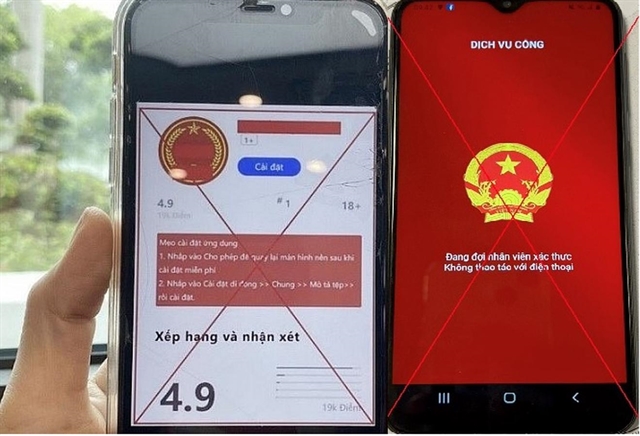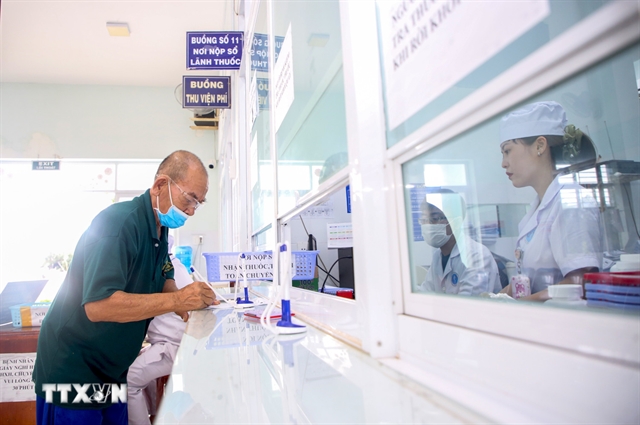 Economy
Economy

 |
| A malicious app disguised as a legitimate public service app aims to steal user information. — Photo thanhtra.com.vn |
HÀ NỘI — Cybercriminals in Việt Nam are increasingly leveraging artificial intelligence (AI) to orchestrate highly sophisticated scams, authorities have warned, marking a sharp evolution from traditional fraud tactics.
Deputy Director of the Hà Nội Police Department's Criminal Police Division Lý Hoài Nam said that while scams once relied on simple impersonation, perpetrators are now employing advanced techniques.
"The methods have become far more intricate," Nam said, highlighting how criminals scour social media platforms, photo-sharing sites and even personal data leaks to harvest victims’ images.
Using deepfake software, fraudsters superimpose victims’ faces onto explicit or compromising videos, creating highly realistic fakes. These fabricated products are then used to extort money, with demands for payment in exchange for silence.
Refusal often leads to escalated threats, including sending the videos to victims’ friends, family or posting them publicly online.
In many cases, even after payments are made, criminals continue to demand more, trapping victims in a cycle of coercion. Nam noted that fear of reputational damage often prevents victims from reporting incidents, emboldening perpetrators.
"This reluctance is precisely what allows cybercrime to flourish," he said.
In early 2024, HCM City police dismantled a criminal organisation using deepfake technology to blackmail entrepreneurs and celebrities. The group collected images from social media, employed AI to produce sensitive videos, and demanded hundreds of millions of đồng (tens of thousands of dollars) to suppress them.
One businessman paid VNĐ500 million ($20,000) but faced further threats, prompting him to alert authorities. The swift police response led to the arrest of the suspects and the seizure of related tech equipment.
In March 2024, a high school girl in Hà Nội received a message from an anonymous account accompanied by a fabricated explicit video featuring her face.
The scammers demanded VNĐ50 million ($2,000) to refrain from sharing it online. Panicked, she borrowed money from friends to comply, but her family discovered the scheme and contacted police, who later apprehended the culprits.
These incidents underscore the growing danger of high-tech crime, serving as a stark reminder of the risks tied to unprotected personal data online.
Nam urged the public to minimise sharing personal photos, stating: "The less information exposed, the lower the risk of exploitation." He advised against posting private or sensitive content, even in closed groups, and recommended strong passwords and multi-factor authentication for online accounts.
Authorities also cautioned against unfamiliar apps requesting access to photos or videos and encouraged awareness of deepfake technology.
"If you’re threatened with compromising material, stay calm, preserve evidence and report it immediately," Nam said, stressing that paying scammers only fuels the cycle.
Minister of Public Security Lương Tam Quang highlighted the escalating complexity of tech-driven crime, often orchestrated across borders.
"Cyberattacks, online fraud and AI-related crimes pose immense challenges," he said, noting their anonymous, organised nature.
The ministry is ramping up technological countermeasures, including software to aid investigations and a crime-reporting feature on the VNeID app under Project 06.
Ngô Tấn Vũ Khanh, country director at Kaspersky, called deepfakes "one of the gravest cybersecurity threats today". He explained that criminals exploit AI to craft highly convincing images, videos and voice recordings, often bypassing authentication systems to enable illegal transactions or undermine security protocols.
Kaspersky’s 2024 data revealed that 21 per cent of phishing emails were AI-generated, a sign of the increasing sophistication of these attacks. Khanh warned that deepfake scams are just one facet of a broader threat landscape, citing cases where fraudsters have used stolen biometric data to access bank accounts or create fraudulent identities.
Khanh warned that non-technical scams, like impersonating bank staff to trick victims into revealing one-time passwords or biometric data, remain prevalent. Malware disguised as legitimate apps also poses a severe risk, allowing hackers to steal sensitive information remotely.
Amid these increasingly sophisticated threats, financial institutions should proactively strengthen their defences and maintain constant vigilance, Khanh said. Authorities are urged to intensify efforts to educate the public about common scams, prevention measures and appropriate responses to fraudulent activities.
Network administrators should routinely check systems and install updates to patch security vulnerabilities, while deploying advanced tools capable of flagging email irregularities, he added. Staying informed about the latest threats is critical, enabling cybersecurity professionals to tackle emerging risks.
As cybercriminals exploit the speed and anonymity of the internet, Minister Quang called for heightened public vigilance and international cooperation to combat the borderless threat, urging citizens to safeguard their data and report incidents promptly to curb the rising tide of AI-driven fraud. — VNS




